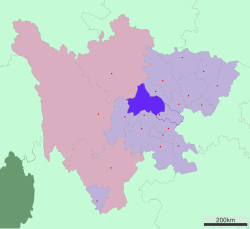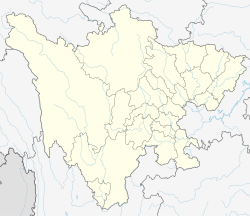
Back Chengdu ACE Chengdu AF تشنغدو Arabic تشنجدو ARZ Chengdu AST Çendu AZ Чэнду BA Chengdu BAN Чэнду BE Чэнду BE-X-OLD
Chengdu
成都市 Chengtu | |
|---|---|
| City of Chengdu | |
| Nicknames: Hibiscus City, Brocade City | |
 | |
 Location of Chengdu City jurisdiction in Sichuan | |
| Coordinates (Tianfu Square): 30°39′36″N 104°03′48″E / 30.66000°N 104.06333°E | |
| Country | China |
| Province | Sichuan |
| Municipal seat | Wuhou District |
| Divisions - County-level | 12 districts, 5 county-level cities, 3 counties |
| Government | |
| • Type | Sub-provincial city |
| • Body | Chengdu Municipal People's Congress |
| • CCP Secretary | Cao Lijun |
| • Congress Chairman | Li Zhongbin |
| • Mayor | Wang Fengchao |
| • CPPCC Chairman | Zhang Shan |
| Area | |
• City | 14,378.18 km2 (5,551.45 sq mi) |
| • Urban | 3,679.9 km2 (1,420.8 sq mi) |
| • Metro | 4,558.8 km2 (1,760.2 sq mi) |
| • Downtown | 465.88 km2 (179.88 sq mi) |
| Elevation | 500 m (1,600 ft) |
| Highest elevation | 5,364 m (17,598 ft) |
| Lowest elevation | 378 m (1,240 ft) |
| Population (2020 census)[2] | |
• City | 20,937,757 |
| • Density | 1,500/km2 (3,800/sq mi) |
| • Urban | 15,419,445 |
| • Urban density | 4,200/km2 (11,000/sq mi) |
| • Metro | 16,045,577 |
| • Metro density | 3,500/km2 (9,100/sq mi) |
| • Major ethnic group | Han |
| GDP[3] | |
| • City | CN¥ 2.207 trillion US$ 325 billion |
| • Per capita | CN¥ 103,500 US$ 15,250 |
| Time zone | UTC+08:00 (China Standard) |
| Postal code | 610000–611944 |
| Area code | (0)28 |
| ISO 3166 code | CN-SC-01 |
| License plate prefix | 川A and 川G |
| Tree | Ginkgo biloba |
| Flower | Hibiscus mutabilis |
| HDI (2015) | 0.791[4] (21st) – high |
| Website | www |
| Chengdu | |||||||||||||||||||||||||||||||||||||||
|---|---|---|---|---|---|---|---|---|---|---|---|---|---|---|---|---|---|---|---|---|---|---|---|---|---|---|---|---|---|---|---|---|---|---|---|---|---|---|---|
 "Chengdu" in Chinese characters | |||||||||||||||||||||||||||||||||||||||
| Chinese | 成都 | ||||||||||||||||||||||||||||||||||||||
| Hanyu Pinyin | Chéngdū | ||||||||||||||||||||||||||||||||||||||
| |||||||||||||||||||||||||||||||||||||||
| Postal | Chengtu | ||||||||||||||||||||||||||||||||||||||
| Literal meaning | "The Established Capital City" | ||||||||||||||||||||||||||||||||||||||
| |||||||||||||||||||||||||||||||||||||||
| Former name | |||||||||||||||||||
|---|---|---|---|---|---|---|---|---|---|---|---|---|---|---|---|---|---|---|---|
| Xījīng | |||||||||||||||||||
| Chinese | 西京 | ||||||||||||||||||
| Literal meaning | Western Capital | ||||||||||||||||||
| |||||||||||||||||||
| Nicknames | |||||||||||||||||
|---|---|---|---|---|---|---|---|---|---|---|---|---|---|---|---|---|---|
| City of Brocade | |||||||||||||||||
| Traditional Chinese | 錦城 | ||||||||||||||||
| Simplified Chinese | 锦城 | ||||||||||||||||
| Literal meaning | Brocade City | ||||||||||||||||
| |||||||||||||||||
| City of Hibiscus | |||||||||||||||||
| Chinese | 蓉城 | ||||||||||||||||
| Literal meaning | Hibiscus City | ||||||||||||||||
| |||||||||||||||||
Chengdu[a] is the capital city of the Chinese province of Sichuan. With a population of 20,937,757 at the 2020 census,[5] it is the fourth most populous city in China, and it is the only city with a population of over 20 million apart from direct-administered municipalities. It is traditionally the hub of Western China.
Chengdu is in central Sichuan. The surrounding Chengdu Plain is known as the "Country of Heaven"[b] and the "Land of Abundance". Its prehistoric settlers included the Sanxingdui culture. The site of Dujiangyan, an ancient irrigation system, is designated as a World Heritage Site.[6] The Jin River flows through the city. Chengdu's culture reflects that of its province, Sichuan; in 2011, it was recognized by UNESCO as a city of gastronomy.[7] It is associated with the giant panda, a Chinese national symbol that inhabits the area of Sichuan; the city is home to the Chengdu Research Base of Giant Panda Breeding.
Founded by the Kingdom of Shu in the 4th century BC, Chengdu is unique as the only major Chinese settlement that has maintained its name unchanged throughout the imperial, republican, and communist eras for more than two thousand years. It was the capital of Liu Bei's Shu Han Empire during the Three Kingdoms Era, as well as several other local kingdoms during the Middle Ages.[8] During World War II, refugees from eastern China fleeing from the Japanese settled in Chengdu. After the war, Chengdu was briefly the capital of the Nationalist republican government until it withdrew to Taipei on the island of Taiwan. Under the PRC, Chengdu's importance as a link between Eastern China and Western China expanded, with railways built to Chongqing in 1952, and Kunming and Tibet afterward.[8] In the 1960s, Chengdu became an important defense industry hub.
Chengdu is now one of the most important economic, financial, commercial, cultural, transportation, research, and communication centers in China. Its economy is diverse, characterized by the machinery, automobile, medicine, food, and information technology industries. Chengdu is a leading financial hub, ranking 35th globally on the 2021 Global Financial Centres Index.[9] Chengdu also hosts many international companies; more than 300 Fortune 500 companies have established branches in Chengdu.[10] Chengdu is the third Chinese city with two international airports after Beijing and Shanghai.[11] Chengdu Shuangliu International Airport, and the newly built Tianfu International Airport, a hub of Air China and Sichuan Airlines, is one of the 30 busiest airports in the world, and the Chengdu railway station is one of the six biggest in China. Chengdu is considered a "Beta + (global second-tier)" city classification (along with Barcelona and Washington, D.C.) according to the GaWC.[12] As of 2023, the city also hosts 23 foreign consulates, the fourth most in China behind Beijing, Shanghai, and Guangzhou.[13] Chengdu is the seat of the Western Theater Command region of the People's Liberation Army.[14] In 2023, Chengdu became the third Chinese city to host the 31st FISU Summer World University Games, after Beijing 2001 and Shenzhen 2011. The city will also host the 2025 World Games. It is considered one of the best cities in China to live in,[15][16] and also a national central city of China.[17]
Chengdu is one of the world's top 25 cities by scientific research output.[18] The city is home to the greatest number of universities and research institutes in Western China. Notably, these include: Sichuan University, University of Electronic Science and Technology of China, Southwestern University of Finance and Economics, Southwest Jiaotong University, Chengdu University of Technology, Sichuan Normal University, and Xihua University.[19]
- ^ 四川统计年鉴——2018 (in Chinese (China)). Sichuan Bureau of Statistics. Archived from the original on 26 December 2019. Retrieved 26 December 2019.
- ^ "China: Sìchuān (Prefectures, Cities, Districts and Counties) – Population Statistics, Charts and Map". Archived from the original on 20 January 2022. Retrieved 14 January 2022.
- ^ "2022年GDP100强城市榜:江苏13市均超4000亿,10强有变化". yicai.com. Archived from the original on 31 January 2024. Retrieved 27 March 2024.
- ^ 《2013中国人类发展报告》 (PDF) (in Chinese). United Nations Development Programme China. 2015. Archived (PDF) from the original on 29 November 2013. Retrieved 14 May 2014.
- ^ "China: Sìchuān (Prefectures, Cities, Districts and Counties) - Population Statistics, Charts and Map". www.citypopulation.de. Archived from the original on 20 January 2022. Retrieved 8 November 2022.
- ^ "中国的世界遗产". cctv.com. Archived from the original on 30 September 2022. Retrieved 30 September 2022.
- ^ "Chengdu: UNESCO City of Gastronomy". UNESCO. 26 May 2011. Archived from the original on 17 February 2020. Retrieved 13 June 2019.
- ^ a b "Chengdu | China". Encyclopædia Britannica. Archived from the original on 15 April 2019. Retrieved 13 June 2019.
- ^ "The Global Financial Centres Index 29" (PDF). Long Finance. March 2021. Archived from the original (PDF) on 22 March 2021. Retrieved 26 March 2021.
- ^ "Chengdu thrives as international gateway hub". qingbaijiang,chengdu,China.[permanent dead link]
- ^ Guo Rui (27 June 2021). "China opens new gateway to giant panda country in Chengdu". South China Morning Post. Archived from the original on 10 August 2023. Retrieved 10 August 2023.
- ^ "The World According to GaWC 2016". Globalization and World Cities Research Network. Loughborough University. 14 November 2018. Archived from the original on 3 May 2017. Retrieved 14 November 2018.
- ^ "Games a financial winner for city". www.chinadaily.com.cn. Archived from the original on 10 August 2023. Retrieved 10 August 2023.
- ^ "Snapshot: China's Western Theater Command". Jamestown. Archived from the original on 30 March 2019. Retrieved 13 June 2019.
- ^ Kuo, Lily (4 February 2019). "Inside Chengdu: can China's megacity version of the garden city work?". The Guardian. ISSN 0261-3077. Archived from the original on 13 June 2019. Retrieved 13 June 2019.
- ^ Flannery, Russell. "Shanghai Tops New Forbes China Ranking of Best Cities For Living". Forbes. Archived from the original on 3 August 2019. Retrieved 13 June 2019.
- ^ "九大国家中心城市何以崛起--理论-人民网". theory.people.com.cn. Archived from the original on 10 June 2019. Retrieved 10 April 2024.
- ^ "Leading 200 science cities | Nature Index 2023 Science Cities | Supplements | Nature Index". www.nature.com. Archived from the original on 22 November 2023. Retrieved 22 November 2023.
- ^ "US News Best Global Universities Rankings in Chengdu". U.S. News & World Report. 26 October 2021. Archived from the original on 30 October 2021. Retrieved 30 October 2021.
Cite error: There are <ref group=lower-alpha> tags or {{efn}} templates on this page, but the references will not show without a {{reflist|group=lower-alpha}} template or {{notelist}} template (see the help page).








